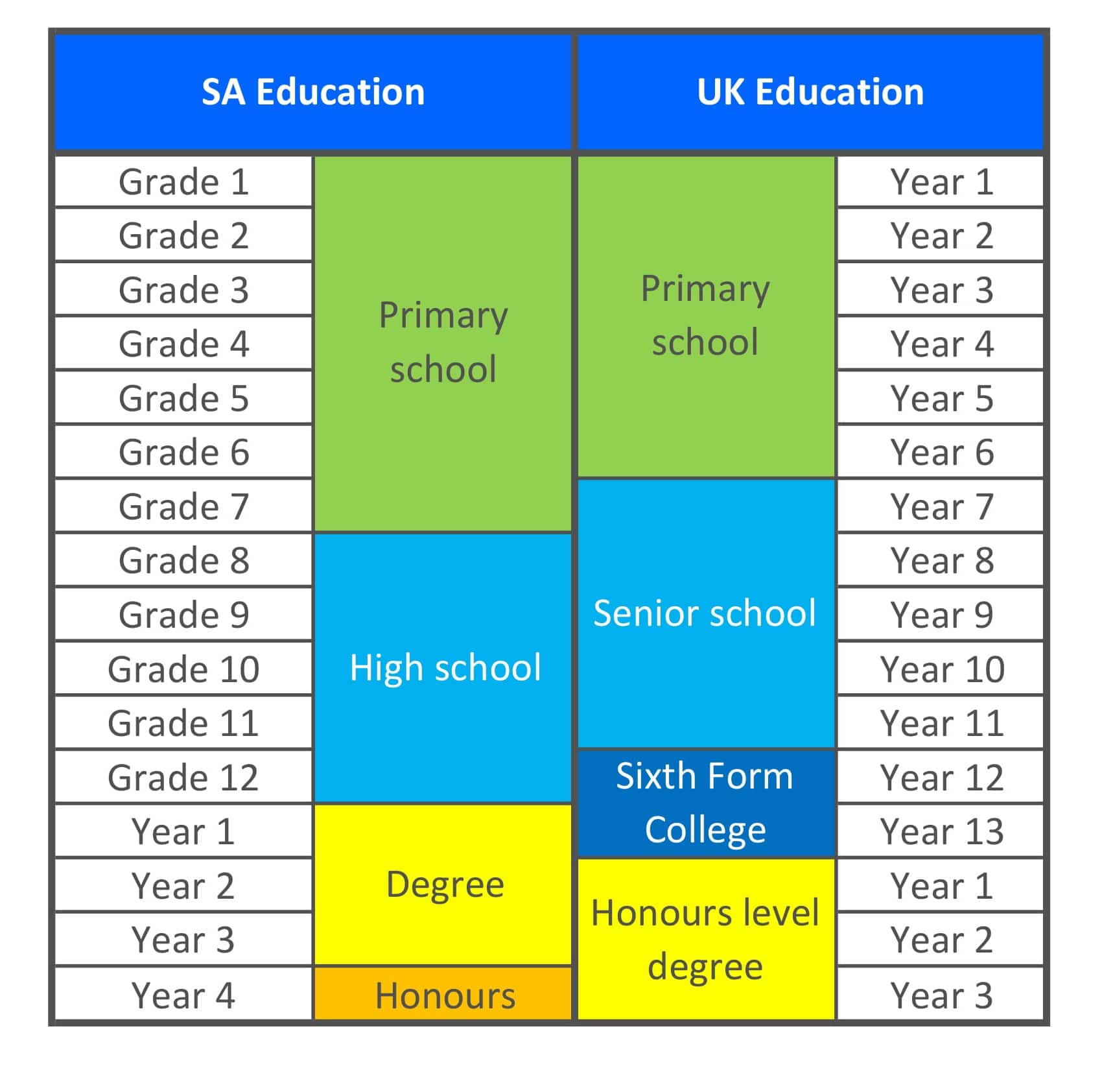Introduction
This article has been written to provide an overview of universities in the UK for students and parents of students who are planning to study in the United Kingdom, particularly coming from South African IEB and CAPS schools.
If you are interested in getting into a prep school, senior school or sixth form college in the UK, you can find out more here.
Quick Answers/ Table of Contents:
Genius Premium Tuition
We have been supporting students in South Africa since 1993.
In that time, we have taught over 2800 students, helping them get into universities in the UK and all over the world.
We hope to give you a sense of the landscape, how to apply, what you might be required to do, and what to look out for.
1. Types of universities
There are 130+ universities in the United Kingdom, 105+ of which are in England. These 130+ universities are a subset of 160+ Higher Education Institutions in the UK – the term ‘university’ is protected by law.
We find that it is useful to think about all of these universities categorically, and so we list some of the more common categories below:
- Ancient universities
- Redbrick or civic universities
- Plate glass/ 1960s universities
- New universities or Polytechnic and metropolitan universities
- Russell Group universities
Note that these categories do not encompass all of the universities in the UK, and many universities fall into more than one of these categories.
Ancient universities
These are the universities that were formed in medieval and renaissance times – from around 1100 to 1582.
This is a list of all the universities in this category and their dates of establishment:
- University of Oxford, 1096
- University of Cambridge, 1209
- University of St Andrews, 1413
- University of Glasgow, 1451
- University of Aberdeen, 1495
- University of Edinburgh, 1582
- University of Dublin, 1592
Did you know?As the oldest university in the English-speaking world, Oxford is a unique, historic institution. There is no clear date of foundation, but teaching existed at Oxford in some form in 1096 and developed rapidly from 1167, when Henry II banned English students from attending the University of Paris.
Red brick or civic universities
In the 1800s, there was an urgent need for a workforce with technical and scientific skills to meet the demands of the new economy that the Industrial Revolution was creating.
This led to the creation of specialised schools and private education institutes, often dedicated to fields such as medicine or engineering, such as the Birmingham Medical School in 1825.
Subsequently, some of these universities were granted independent university status; for example, Birmingham Medical School became the University of Birmingham.
Many of these were built in the Gothic style with red bricks – a popular trend at the time – hence the nick name: ‘red brick’ universities.
- University of Birmingham
- University of Bristol
- University of Leeds
- University of Liverpool
- University of Manchester
- University of Sheffield
Plate glass/ 1960s Universities
The term ‘plate glass universities’ was coined by Michael Beloff and refers to a group of universities in the United Kingdom established or promoted to university status in the 1960s. Plate glass refers to their modern architectural design, which often contains wide expanses of plate glass in steel or concrete frames. This contrasted with the red brick and ancient universities:
“I had at the start to decide upon a generic term for the new universities – they will not be new forever. None of the various caps so far tried have fitted. “Greenfields” describes only a transient phase. “Whitebrick”, “Whitestone”, and “Pinktile” hardly conjure up the grey or biscuit concrete massiveness of most of their buildings, and certainly not the black towers of Essex. “Newbridge” is fine as far as the novelty goes, but where on earth are the bridges? Sir Edward Boyle more felicitously suggested “Shakespeare”. But I have chosen to call them the Plateglass Universities. It is architecturally evocative; but more important, it is metaphorically accurate.”
Michael Beloff listed these universities:
- University of East Anglia
- University of Essex
- University of Kent
- Lancaster University
- University of Sussex
- University of Warwick
- University of York
There are 20 other universities sometimes referred to as plate glass universities, including Aston University, University of Bath, and the University of Buckingham.
New universities or Polytechnic and metropolitan universities
These universities have evolved from Polytechnics, Further Education Colleges, Teacher Training Colleges, University Colleges and other higher education institutions as part of the education reforms between the 1980s and 1990s. Although they have recently received their university status, their education roots are old. These universities are growing exponentially and competing with other older institutions in terms of new facilities and a modern outlook.
Some examples of these universities, along with their area of specialisation, are:
- Arden universities; Business Studies
- Cardiff Metropolitan University; Tourism Management and Food Technology
- University of Chichester; Media Studies, Production, and Music Composition
- Plymouth Marjon University; Education, Creative Arts, Health Sciences and Sport
- University College Birmingham; Tourism, Events and Hospitality Management
Russell Group universities
The Russell Group is a catch-all term for a group of universities with a shared focus on research and a reputation for academic achievement. The group receives two-thirds of all research grant funding from the government, and its member universities are often regarded as the ‘best’ in the UK.
This group consists of 24 universities and includes all six of the red brick universities listed above. Some other examples include:
- University of Cambridge
- University of Oxford
- University College London
- Imperial College London
- London School of Economics & Political Science
- University of Edinburgh
2. Application Process
If you are applying to universities in the UK, you will need to use UCAS.
What is UCAS?
UCAS stands for Universities and Colleges Admissions Service. It’s the centralised service that all students (local and international) use to apply to universities in the UK.
The UCAS is to UK universities what the Common App is to US Universities, except that for a vast majority of universities in the UK – if you want to study an undergraduate degree – you will have to apply through UCAS.
The Apply function is used to put together and send off your university applications. Essentially, they are there to make sure your application to university runs smoothly. Find out more here.
There is currently debate surrounding the fairness and transparency of the UCAS admissions system, something which UCAS is aiming to address in the near future. Until then, it is the only way, as a prospective undergraduate, to apply to the vast majority of universities in the UK.
Conditional vs Unconditional offers
After you submit your application to a university, they will come back with one of three responses:
- An unconditional offer.
This means you’ve got a place, although there might still be a few things to arrange. - A conditional offer.
This means you still need to meet the requirements – usually exam results. - Unsuccessful or withdrawn.
Your application has not been successful, and you will not be offered a place.
Unconditional offers
This means you’ve already met the entry requirements, so the place is yours if you want it!
Check the offer carefully. Even if you’ve already got your qualifications and have met the academic requirements, you might still need to get a DBS or PVG check, provide proof of your results, or meet some financial/medical requirements. If it’s not clear, contact the university or college.
By accepting an unconditional offer, you are committing to attend that university.
Conditional offers
You will be shown the conditions you have to meet to get your place confirmed.
For most people, this means waiting for your final results to see if your exam results meet the conditions. They could be a combination of grades, scores, or subjects – this will be explained on UCAS.
A conditional offer might look something like this:
- A levels grade AAB with A in chemistry and at least two other sciences or mathematics
- 36 points from your International Baccalaureate Diploma, to include six for HL English
- AAA from three A levels, or AAB from three A levels and grade B in your Extended Project
You may also get a conditional offer that will change to unconditional if you firmly accept it.
Firm vs Insurance Choice
After you have applied and heard back from universities, you can accept a maximum of two choices – one firm and one insurance. You can only have an insurance choice if your firm choice is a conditional offer. If you accept an unconditional offer as your firm choice, then the place is guaranteed, so you cannot have an insurance choice.
- Firm: this is your first choice – the place you most want to go to. If you accept a conditional offer and meet the conditions, you’ll have a confirmed place here.
- Insurance: this is the choice you’d make if you didn’t meet the conditions of your firm choice. If this is a conditional offer, you’d need to meet the conditions for your place to be confirmed.
3. Commonly Required Exams
When studying in the US, many universities require that you take the SAT. Similarly, many universities require that you take standardised tests, in addition to your secondary school courses, for entrance into specific undergraduate courses. We list a few (and provide a very brief overview) of the more popular ones below:
IELTS
The International English Language Test (IELTS) is designed to help you work, study or migrate to a country where English is the native language. This includes countries such as Australia, Canada, New Zealand, the UK, and the USA.
As an international student, you must demonstrate a satisfactory standard of spoken and written English to support your application. This can be done by taking the IELTS (International English Language Testing System) Academic test.
Your ability to listen, read, write and speak in English will be assessed during the test. IELTS is graded on a scale of 1-9 (with half points allowed). Each of these four components is then averaged and rounded off to the nearest half.
Some examples of university requirements for international students:
- University of Oxford: 7,5/9,0
- University of Cambridge: 7,0/9,0
- Imperial College London: 7,0/9,0
- University College London: 6,5/9,0
LNAT
The National Admissions Test for Law is used by universities to help them select people for their undergraduate law courses.
The test doesn’t test your knowledge of law or any other subject. Instead, it helps universities assess your aptitude for the skills required to study law.
The LNAT helps universities make fairer choices from the many highly qualified applicants who want to join their undergraduate law programmes.
It is a two-part test:
Section A: This is a computerised multiple-choice exam. You’ll be asked to read passages of text and answer comprehension-type questions. A mark out of 42 is generated, and this is known as your LNAT score.
Section B: Here, you will write one essay from a list of three proposed subjects. This section is not marked by the test centre and does not contribute to your ‘LNAT score’ but will often be marked by a university — and count for admission.
Some examples of average scores of successful applicants:
- University of Oxford: ±29/42
- University of Bristol: ±25/42
- King’s College London: ±22/42
- University of Glasgow: ±22/42
MAT
The Mathematics Admissions Test (MAT) is a paper-based test. It is a 2-hour and 30-minute, subject-specific admissions test for applicants to undergraduate degree courses in Mathematics and Computer Science.
If you are applying to the University of Warwick for the Mathematics BSc (G100) degree or Master of Mathematics (G103) degree, you are encouraged to take the MAT. Taking a test is not compulsory; however, a good performance on the MAT or the TMUA may improve your chances of getting an offer. For details, visit the University of Warwick’s Mathematics Institute website.
The MAT aims to test the depth of mathematical understanding of an A-Level student (or equivalent) rather than their breadth of knowledge.
The mathematical knowledge and techniques required are taken from a syllabus roughly corresponding to the content of AS-level Mathematics (with a few A level concepts – see past papers here).
Question 1 on the test is multiple choice.
After Question 1, candidates are required to select four of six questions to attempt. These are long-form questions, and candidates will need to show their working out.
The question selection depends on the degree for which you are applying, and the details of which questions you should attempt are given on the front page of the test and throughout the paper.
No calculators, formula sheets, or dictionaries are permitted during the test.
This test is used by:
- The University of Oxford
- Imperial College London
- University of Warwick
STEP
The Sixth Term Examination Paper Mathematics is a well-established mathematics examination designed to test candidates on questions that are similar in style to undergraduate mathematics.
The test consists of up to two 3-hour paper-based examinations: STEP 2 and STEP 3. Each exam consists of 12 questions, from which candidates must select 6 to answer.
Candidates are usually required to sit either one or two of the examinations, depending on the requirements of the universities they have applied to.
This test is used by:
- The University of Oxford
- Imperial College London
- University of Warwick
Other universities sometimes ask candidates to take STEP as part of their offer. In addition, a number of candidates sit STEP papers as a challenge.
TMUA
The Test of Mathematics for University Admission (TMUA) is designed to give you the opportunity to demonstrate that you have the essential mathematical reasoning skills necessary for a demanding undergraduate Mathematics course.
You’re encouraged to take TMUA when applying to study Mathematics or Mathematics-related courses such as Economics and Computer Science at certain universities. In most cases, the test is not compulsory; however, a good performance on this test may benefit your application.
The universities below accept results from the test:
- University of Bath
- Cardiff University
- Durham University
- University of Nottingham School of Mathematical Sciences
- Lancaster University
- University of Sheffield
- London School of Economics and Political Science
- University of Southampton
- University of Warwick
UCAT/ UKCAT
The UCAT stands for University Clinical Aptitude Test (previously called the UKCAT – UK Clinical Aptitude Test), is used by a number of UK universities to filter candidates looking to apply for a degree in medicine or dentistry.
The UCAT is a two-hour computer-based test developed to evaluate aptitude and professional behaviour rather than medical knowledge.
It comprises five subtests: Verbal Reasoning, Quantitative Reasoning, Abstract Reasoning, Situational Judgement and Decision Making. The UCAT does not include any science-based content or curriculum material. Instead, the assessment focuses on evaluating cognitive abilities, attitude, and professional behaviours.
Not all universities rely heavily on, or even require, a UCAT score – but enough do to make it an important part of your CV. Here is a list of some of the universities that tend to rely heavily on the UCAT:
- University of Glasgow
- King’s College, University of London
- University of Liverpool
- Queen Mary, University of London
- University of Sheffield
- University of Southampton
BMAT
The BioMedical Admissions Test (BMAT) gives you the chance to stand out from the crowd and show your potential to succeed in medical and health-related courses. It tests your ability to apply scientific and mathematical knowledge, as well as problem-solving, critical thinking and written communication skills that are essential to university-level study.
It is a two-hour admissions test that assesses a combination of aptitude and knowledge. The BMAT tests a broad range of skills across three sections:
- Section 1 tests your skills in problem-solving, understanding arguments, data analysis, and inference. It consists of 32 multiple-choice questions to be completed in 60 minutes.
- Section 2 tests your ability to apply scientific knowledge covered in GCSE science and mathematics by the age of 16. It consists of 27 multiple-choice questions to be completed in 30 minutes.
- Section 3 tests your ability to select, develop and organise ideas, and to communicate them in writing, concisely and effectively. It consists of a 30-minute essay on one of three topics that you choose.
No calculators, formula sheets or dictionaries are permitted during the test.
These universities require the BMAT for Medicine:
- University of Cambridge
- University of Oxford Medical School
- Imperial College London
- University College London
- Leeds’ School of Medicine
- Brighton & Sussex Medical School
- Keele University
- Lancaster University
4. Do UK universities accept an IEB Matric?
The short answer is that some do and some don’t.
Roughly 85% of all universities in the United Kingdom will accept an IEB without A levels. However, this number drops to 60% when looking at the top 10.
For example, the University of Cambridge and the University of Oxford require A levels and will not accept NSC/ IEB students, whereas the University of St Andrews will.
You can email the universities’ admissions department to find out if they will accept an NSC certificate from South Africa.
For the universities that don’t accept the IEB, you will need to complete three or so A-Levels (or equivalent).
In the UK, A levels are a 2-year course, typically completed at a sixth form college. These two years are loosely equivalent to the South African matric and the first year at a university in SA:

Typically, these A levels are done in the year preceding your IEB matric. This is because full A levels are the year after AS levels, which are considered the closest equivalent to the South African matric.
5. What are UK Universities looking for?
Each university has different entry requirements. You should check whether you meet the course and university entry requirements before you apply. However, there are other factors university admissions teams consider when making their decisions:
- What other academic and non-academic achievements do you have?
- Do you have the experience and skills to succeed at university?
- Do you have a passion for the subject area, and does this enthusiasm come across in your application?
- Who are your references, and what have they said about you?
- Are the course and university you’ve applied for the right course and university for you?
- Have you included your individual circumstances? For example, have you been in care? Do you have a disability, such as a mental health condition? Admissions staff will want to consider your achievements in context. This is called ‘contextualised admissions’, and the aim is to form a more complete picture of you as an individual.
This information will be conveyed in your Personal Statement. Ultimately, it’s the job of the university admissions team to determine whether you can succeed on the course you have applied for.
The weighting and allocation of importance to various aspects of your application will vary from university to university; however, most universities consider these as the bulk of your application, in order of importance:
- A-Levels/ IEB
- Additional Standardised test (if applicable)
- IGCSEs/ IEB
- Personal Statement
What is a Personal Statement?
A personal statement supports your application to study at a university or college. It’s a chance for you to articulate why you’d like to study a particular course or subject, and what skills and experience you possess that show your passion for your chosen field.
You have 4000 characters (roughly 500 words) to sell yourself. In general, admissions departments are looking for:
- The reason you have a particular interest in this course.
- Evidence that you have an enthusiasm for the subject, which could be demonstrated by:
- Relevant work experience/shadowing or voluntary work
- Additional reading and research around relevant topics
- Membership of related societies/clubs
- A range of interests outside of academic study; for example, sport or music
- Evidence that you are a motivated individual who has something to contribute to the university.
- The ability to work both individually and in teams.
6. Best universities in the UK
Each year since 2008, Times Higher Education has compiled a “Table of Tables” to combine the results of the three mainstream league tables. In the 2021 table, the top five universities were:
- The University of Cambridge
- The University of Oxford – tied for first with Cambridge
- The University of St Andrews
- The London School of Economics
- Durham University
These are the best universities in general, but what about course-specific rankings? The Complete University Guide has an easy to use ranking system.
Here are some of the best universities, by course, in the United Kingdom:
Business
- University of St Andrews
- King’s College London
- University of Bath
- UCL (University College London)
Economics
- University of Cambridge
- University of Oxford
- University of St Andrews
- University of Warwick
Medicine
- University of Dundee
- University of Glasgow
- University of Oxford
- University of Aberdeen
Biological Sciences
- University of Cambridge
- University of Oxford
- University of Dundee
- Imperial College London
Communication and Journalism
- Loughborough University
- University of Leeds
- Newcastle University
- University of Sheffield
Engineering
- University of Cambridge
- University of Oxford
- Imperial College London
- Strathclyde
Law Schools
- University of Cambridge
- University of Oxford
- University College London
- King’s College London
7. A-Level, IEB, and Standardised Test Support
Grade 9 is a good time to start thinking about all of this. If you plan on getting into a university in the United Kingdom, you should start planning far in advance, depending on the degree and institution you are aiming for.
That’s where we come in. We have a sophisticated assessment and consultation process that can help you choose the right university, improve your IEB/ CAPS results, and prepare for any required entrance exams.
As part of our assessment process, we identify gaps in the fundamentals of each subject a student is taking in school, and in the standardised tests they will be taking.
We then fill in those gaps systematically through premium, one-on-one tuition with our trained in-house team of tutors. This can be done online or in person.
See what our parents have to say.
Why Genius?
Genius has been supplementing the school system and preparing students academically for entry into the United Kingdom for 28 years.
We are not a just tutoring agency; our team of tutors are in-house instructors who have been through a very rigorous vetting and training programme, and we work very closely with them, the school, and your family over the duration of the course to ensure a great result.
Here are some of the things that parents have said about our programme:
- The assessment process is convenient and pain-free.
- The lessons happen at a time that suits you, even if that means mornings or weekends.
- These are one-on-one lessons that happen in your home or online.
- You will improve your school marks.
- You will pass your standardised tests.
- You will, therefore, have access to a bigger pool of universities to choose from.
- Once your kid gets there, they will be well-positioned to excel academically.
You can book an assessment by heading over to our contact page, or reaching us directly at uk@geniuspremium.com, or +27 11 467 9884.



